Coffee! Yea! Too bad it wears off so quick....
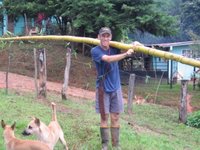
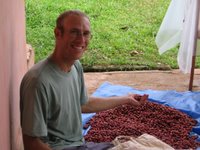
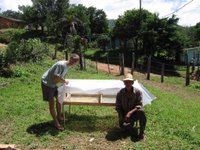
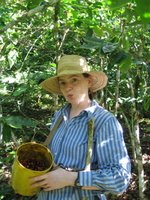
I've been thinking about the weird skewed prices and shopping experiences in this country. We go into a grocery store in Santiago, and it looks almost exactly like a grocery store in the U.S. The only differences are much larger sections devoted to hot dogs, rice, and beans. We got very excited this time: a little searching brought us to whole wheat pasta, a welcome addition to the pasta & soy protein chunk meal that is a standard already. Especially when it gets washed down by a fine box of Clos, the upscale volunteer's good friend. Clos is box wine, but it comes in a box like soymilk does in the U.S., and costs about $1.80/liter. It is surprisingly drinkable, and considering the other drinking options are terrible lagers and liquors that double as paint stripping chemicals, it is very welcome. But back to the prices. This country really lacks a manufacturing base, so many foods are imported, giving many of the foods U.S. prices.

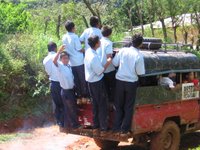
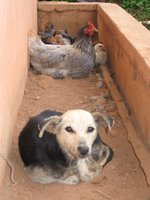
One thing that fortunately is not at U.S. prices is coffee. You can get good stuff from the highlands of western Panama for around $2.20-$2.70 a pound (roast, ground, packaged commercially). The local stuff here in Chitra goes for $1.50 a pound, but we don't buy it. If you don't drink good coffee or really care anything about it, you should stop reading right not. Ok, for the bored or slightly interested, I have to first admit that I truly am addicted to good coffee. So even though Panama produces some fine coffee, and even though our community could (details to follow) produce excellent stuff, the last 5 months of living with a host family have been hard and frustrating (from my addiction point of view). But today, hallelujah, all is good and well here in Chitra! Because today, we made our very own coffee. And whe extra work? It ends up being a vicious circle- mediocre coffee leads to low prices, and low prices lead back to mediocre coffee. My big goal here is to help just a couple producers break out of that cycle, start focusing on quality, and find a buyer who will pay more for that quality. Once that happens, ideally others will hear about the better price and be interested in getting on the bandwagon. Down the road, as the coffee from this area becomes known, it'll open up other market paths, possibly through organic certification or formation of an operational cooperative.
Not only do they not process the coffee well, but they roast and brew it in a way that focuses on maximizing the volume of coffee you get per bean. Which is fine, since even though they get a low price, they still get cash, and if they can sell more while still having enough for themselves, well, go for it. But good lord, it is crap. In my opinion. First, they roast the living shit out of the coffee. It looks and smells like charcoal. Then they grind it very finely, and boil the living shit out of the grinds, using just enough to give the water a faint coffee taste. The resulting beverage is finally sweetened with obscene amounts of sugar, sometimes completely covering up the taste of the coffee. Now, I'm harshly critical of all this, and I won't apologize, since as I said, I like good coffee. I think an important part of my job here is to educate people and make it clear that the coffee that is exported to specialty coffee roasters in the U.S. and Europe is prepared very differently, so the poor processing that is totally masked by the brewing process here is much more apparent and undesirable in those markets. But damn it, my Spanish is still crappy, so getting this across is very challenging.
Anyway, suffice it to say that the coffee we roasted in our wok, ground, and brewed in a french press today was very encouraging. It would not be out of place in any good coffee shop I've been to in the U.S.- nice and earthy, a dark roast does it justice, and this was without the several months of resting that improves the flavor. I'll be experimenting with different varietals, soil types, processing strictness, roasts, and brewing techniques over the next couple months at least. I'm also going to work on getting some of the local stuff tested, to see if it meets the taste criteria for export quality.
Finally, Karinne and I want to help organize a Peace Corps Panama Coffee Challenge. Our idea is still in development, but it involves volunteers in coffee producing areas working with local producers to produce a small quantity of well-processed coffee. This coffee can then be tested, or "cupped" as the expression goes, to see which meet the criteria for export. This cupping can be a publicized event, ideally sponsored by a U.S. or European roaster, who would agree to pay a fair price for small batches of the coffee that meets a certain quality standard. We are lucky enough to have a PCV who's title is "Coffee Coordinator" who is very knowledgeable and enthusiatic (fellow addict) and who may play a big role in setting this up. We will see!
Now the coffee is wearing off, and dinner is calling. Not as much rain today, except for in the kitchen, where the faucets I installed yesterday got shot off the pipe by high water pressure, spraying maybe ten gallons of water all over before I got it shoved back on. Ah, the fun of home improvements will maybe never end........ The roof still leaks, the sink (all 150 lbs. of concrete of it) is still sitting on our front porch, waiting for cement to install it with, and mosquitoes are amazingly proficient at finding their way into the house at night. Still, it is home, and it feels good to have a place to call home. Where we can make gringo coffee and food in peace. Or at least relative peace, if you discount the nosy kids and the loud dueling roosters.
So, a few people have wondered what our and locals' average day is like here. We usually get up early-ish, maybe 6 or 6:30, which is late by local standards, since many here are up at 5am. This is especially true for the women, who mostly cook over a fogon, which is three large rocks, often on a sturdy table, which they can balance a pot and put burning wood underneath. Since it often takes a while to get the fire going and breakfast cooking, the women may get up a bit earlier than the men. When the men are up early, they're often sharpening their machetes or doing other things to prepare for the workday. We often have a simple breakfast of leftovers or cereal with powdered milk if we are going out to work with someone, and maybe something more elaborate if we aren't. Many locals have a breakfast of yuca (casava) with a fried egg, or something similar. Food is usually wolfed down amazingly fast, often I've just started a meal by the time any Panamanian we are eating with is done. Then, work begins. These days its harvesting coffee, planting beans, planting corn, or something similar. Many people here work from about 6 or 7 am to around 2 or 3 pm without any food, and sometimes without any water either. Which brings up another interesting point: how little water people drink here. It is crazy from my perspective, but people will often work all day without drinking anything. We'll work side by side with someone all day, and they don't have to go to the bathroom even once. I've been told that many people have kidney problems related to this later in life around here.
Anyway, work all day, then go back, eat lunch, which is often rice or maybe rice and a fried egg, or maybe a stew of beans and rice. Rice is huge, if you haven't caught on. When we were living with our host family, it was a big pile of rice, twice a day, like clockwork. Sometimes there is more work, but usually its around the house; things like sharpening the machete, processing the coffee, or maybe harvesting some things for dinner from a nearby farm plot. Dinner depends a lot on the family, and whether they have electricity. Without electricity, many people will go to bed soon after dark, around 7pm, so they may eat dinner pretty early, maybe 5pm or so. Sometimes there are only two meals a day, breakfast and a late lunch/early dinner around 3 or 4pm. I honestly don't know how people here work as hard as they do on as little food as they eat, and some even manage to have a healthy gut. This schedule is usually followed for 6 days a week. As I think I've said, women may work in the fields sometimes, but men don't seem to ever do housework like laundry or cooking or cleaning. In fact, it has caused a stir when people see me washing our clothes or something like that. Many people hire help for things like harvesting coffee or cutting brush; the going rate is $3/day and lunch, with the workday running from maybe 7am to around 2 or 3pm.
Sundays are for going to church, visiting family and friends, relaxing, or maybe focusing on work around the house. For many men, Sundays are also for getting really, really drunk. Drinking starts early so that they can pass out by mid-afternoon and recover enough to be up early working the next morning. This transitions well to......
"Fucked-up thing of the week"
Well, since we seem to see something that is genuinely fucked-up about once a week, I'll report duly on this week's thing. Now, when I say fucked-up, I mean something that is genuinely wrong; and not just culturally different, but straight-up wrong. For example, 28-year-old men "marrying" 12-year-old girls is wrong (and this happens around here). This week we saw six kids, ages 10 to 14 or so, drunk. One of the younger boys was so drunk he was passed out, and the oldest boy was carrying him slung over his shoulders. This was a mixed group of boys and girls, walking and stumbling along the trail, not long after they got out of school for the day.
Well, to finish on a better note, we saw the puppy we may adopt next month. A guy who often works with our former host family has a nice dog, and it had eight puppies, and they are cute. Actually, they are kind of gross; dirty, with odd crusty sores, but they still are cute. In about a month, they'll be big enough to leave their mom, and we may well take one. We had wanted to adopt an older dog, but there really aren't any strays, and it doesn't seem like people ever want to give away or sell older dogs. The dogs that our former host family own love us, and sometimes follow us over here to our house and hang out, but we can't steal them.
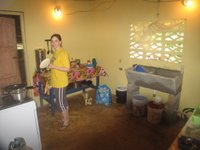
I did dishes in our kitchen sink yesterday. Now, this may not seem like an event worth reporting, but it really is. We have lived here over a month without a kitchen sink. At first, we only had water coming occasionally out of the shower, so we did laundry and dishes in five-gallon buckets while squatting next to the toilet. It sucked. Then, when the water was not working one day, we quickly cut our main pipe and installed a second pipe going around the corner of the house, then up to and into the kitchen window. But still, no sink. Finally our landlord brought a tina, which is a 150lbs. cast concrete sink. It sat at his house for a couple weeks, then he brought it over and sat on our porch for a while longer. You see, we still didn't have the concrete to make the base for it. Finally, we got the cement, screwed up the base once (I made the mix too dry to adhere well), got the base right, grabbed our neighbor to lift it onto the base, and YEAH, we had a sink! But no water: the water stopped working for about 2 and a half days. We were hauling water up from the river and catching rainwater in buckets. Finally, last night, we got water flowing, and it was lovely. Last night marked another crazy luxury, hot water. A long downpour all afternoon made it actually pretty chilly here, so we were dreading our much-needed showers. To make it more do-able, we warmed up a couple gallons of water on the stove, and added it to the bucket for our showers. It was heaven. Such little luxuries mean so much sometimes. Of course, our neighbors would be horrified that we would use propane gas for something so crazy- even when they have a gas stove, they often cook things like beans that take a while over a wood fire, simply because wood is free, yet gas is $6/ tank. In fact, the lady at the nearest store wouldn't sell us dried beans, because she said they would use too much gas to cook. Ah, cultural differences, always great fun!
